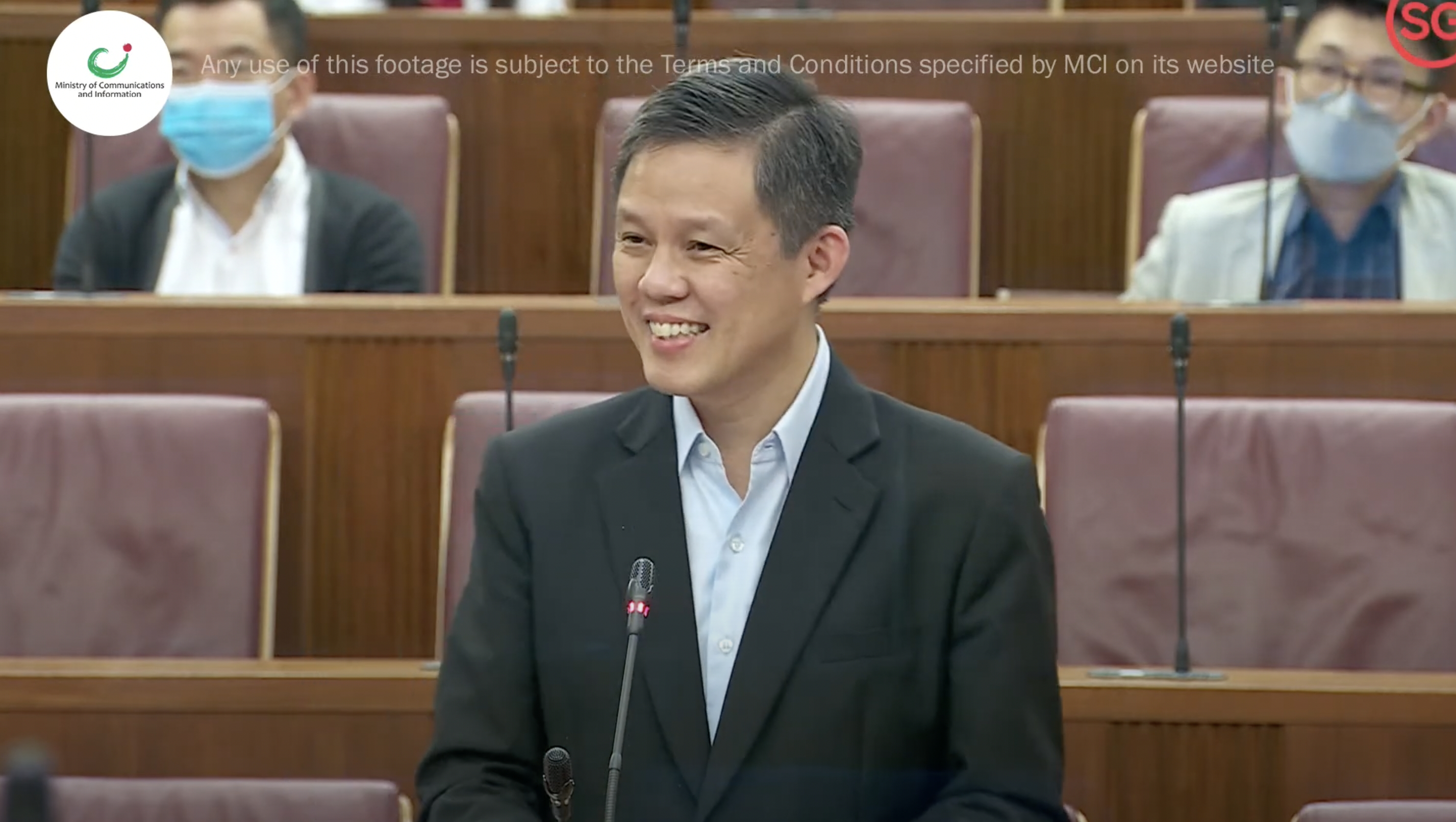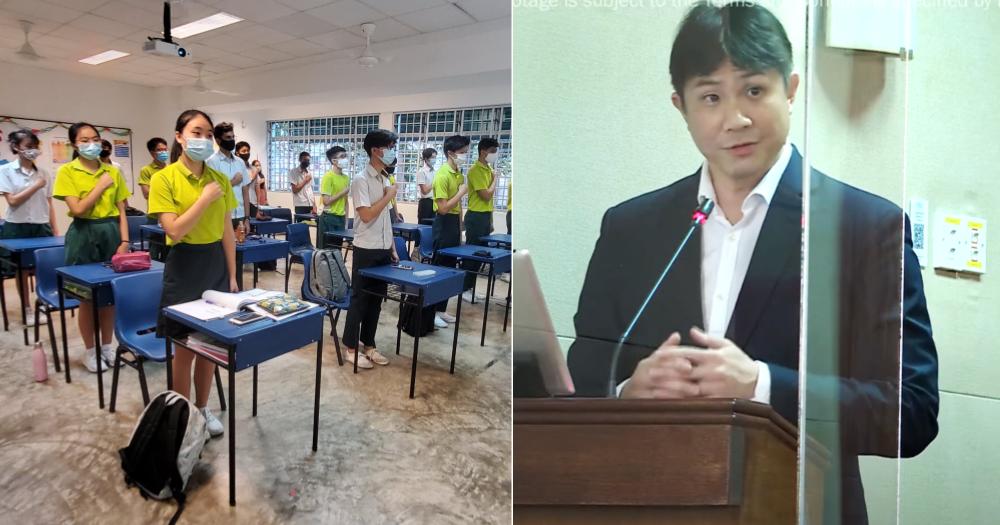Follow us on Telegram for the latest updates: https://t.me/mothershipsg
Workers' Party (WP) Member of Parliament (MP) Jamus Lim suggested later school start times for pre-teens and teenagers, saying that this will improve their behaviour, health, and academic performance.
Lim raised this idea as part of his cuts for the Ministry of Education (MOE)'s Committee of Supply debates, on Mar. 7.
Replying to Lim, Education Minister Chan Chun Sing outlined MOE's policy that MOE does not dictate school start times, apart from setting a "simple baseline" that schools start at 7:30am or later.
He said that the government must "have a care to not try to homogenise all the conditions" across schools, and that greater diversity was important.
Adolescents have different circadian rhythms: Lim
Lim pointed to research showing that adolescents' circadian rhythms predispose them to sleeping and waking later, "by about two hours".
Lim said a possible counter-argument was that delaying start times would just mean that students sleep later.
But Lim said students who have later start times sleep longer, as their bedtimes would either remain unchanged, or get delayed by a smaller amount than the time afforded.
He said studies showed that even "a rather relatively modest delay of just a half an hour or so" produced positive results. He added:
"More importantly, the reality is that students are already experiencing sleep deprivation from the status quo."
He cited "all the marginal steps" parents take to support their children's education, such as tuition, moving closer to preferred schools, and "endless bottles of essence of chicken", and said that these were examples of "failing to pick the lowest hanging fruit" of letting children sleep more.
Primary and Secondary schools should start at 8am and 8:30am respectively
He thus suggested that upper primary cohorts and secondary schools should start at 8am and 8:30am respectively, instead of the current norm of starting at 7:30am.
"The additional half hour for upper primary students is consistent with how sleep phase delay may occur as early as the onset of puberty," he said.
He said he was not suggesting "strict guidelines" for post-secondary levels, but said that an even later start time of 9am for polytechnics, Institute of Technical Education (ITEs) and junior colleges would be "reasonable".
Staggered start times will also ease congestion
Anticipating a counter-argument that delayed start times "could give rise to disruptive rush hour crunches", Lim said that the opposite might in fact be true.
"Delays for upper primary and secondary school students will undeniably alter traffic patterns," Lim conceded, but predicted that this would have a "somewhat limited" impact on rush hour jams.
"With more parents working from home or exercising flexible work schedules in a post-pandemic world, it could easily be the case that any anticipated increase in rush hour traffic be offset by the reduction in working commuters," he reasoned.
Staggered start times would also help alleviate the issue of jams around schools during arrival and dismissal times, Lim added.
CCS: Schools can decide start and end times
Chan explained that MOE's policy on start times comes down to "a simple baseline": that schools can decide when to start and end, as long as they do not start before 7:30am.
They should set start times in line with factors "like their unique needs, student profiles, and the local transport situation".
He cited the example of Junyuan Secondary School in Tampines, which starts at 8:30am twice a week, and at 8am on the other three days.
"Junyuan Secondary is not the only school that has different start times," he added.
Lim asks for information on schools starting later
Lim then rose to ask a clarification question, requesting for the number, or proportion of schools that have later start times, for at least the majority of the school days.
Chan responded by saying that many schools in Singapore have "different start times", with some having different start times on "certain days of the week".
"But it all depends on when they start, when they end. Some of our schools have kept certain of the afternoons totally free for their students and their teachers to recharge and do other things," he continued.
Chan emphasised that "we should strive towards a system that provides more diverse options for our schools, our teachers and our students", in view of the fact that students' learning needs and backgrounds are diverse.
He added:
"I think we must have a care to not try to homogenise all the conditions, when we in fact have agreed that we need greater diversity."
Thus, for school start times, MOE just "has one simple rule", Chan said, and restated it, while stifling laughter:
"Thou shalt not start school before 7:30am."

Chan shared that he had nonetheless received "feedback from different schools" about the matter of changing their start and end times.
"In fact, this is a very good exercise for our students and teachers to come together and decide collectively, what are their priorities, and how do they prioritise the time," he said.
He said he would be "very careful" in his role as Minister for Education to "try to dictate for every school — given there are different conditions — to have the same start or end time."
Instead, he said he wanted teachers and students "to have that agency to take charge of this and come to a reasonable understanding", given each school's different conditions.
MOE has commissioned research studies on sleep for students
Lim had previously asked whether there were plans to re-evaluate school start times in August 2021.
MOE's response to Lim, and to a related question from Tampines MP Cheng Li Hui, was that MOE had "recently commissioned two research studies" on the impact of factors affecting sleep duration and sleep quality of students in Singapore.
"This will help us better understand how later school start time could contribute to students' longer sleep duration," said the Ministry, adding that schools have the autonomy to adopt later start times.
MOE's response also pointed out that aside from the question of delaying school start times, it would need to "work with parents to improve sleep hygiene, manage the overall load on students as well as their use of digital devices".
Top image via Chan Chun Sing on Facebook and screenshot from MCI Parliament live stream
Follow and listen to our podcast here
If you like what you read, follow us on Facebook, Instagram, Twitter and Telegram to get the latest updates.
